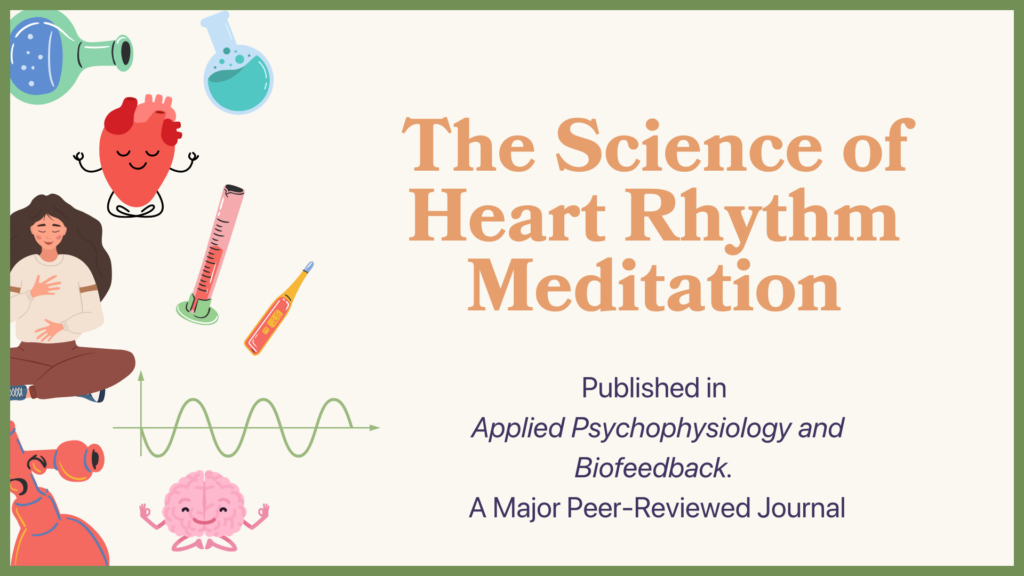
A Study on Heart Rhythm Meditation was Recently Conducted
The study which involved 48 novice meditators, showed that regular practice of Heart Rhythm Meditation for more than 10 min a day over ten weeks, improves well-being. The study also found that multiple measures of Heart Rate Variability and Vagal Tone showed a consistent trend towards improvement in proportion to the time spent practicing meditation over ten weeks. These measures were done while not meditating, thus they reflect encouraging persistent beneficial changes to the brain. Among the benefits that can be expected from these changes are enhanced emotional stability and resilience to stress. Indeed, meditators reported positive effects on stress, well-being, emotional regulation, a more expanded sense of self, and a greater sense of the holistic interconnection of body sensations, heart, and emotions.
Key points:
Heart Rhythm Meditation is great for Stress! Quantitative results showed Heart Rate Variability (HRV) measures of vagal tone improved with amount of meditation time. In separate studies HRV has been shown to be an excellent indicator of a person’s capacity for stress.
The study, involved 48 participants, whose Heart Rate Variability and scores on two validated wellbeing inventories, was measured at the beginning and end of the study. Interviews with several of the participants were another source of data.
The study showed that regular practice of Heart Rhythm Meditation for more than 10 min a day over ten weeks, improves well-being in novice meditators.
The study found that multiple measures of Heart Rate Variability and Vagal Tone showed a consistent trend towards improvement in proportion to the time spent practicing meditation daily over ten weeks. These measures were done while not meditating, thus reflect encouraging persistent beneficial changes to the central nervous system. Among the benefits that can be expected from these changes are enhanced emotional stability and resilience to stress.
What the Participants Say:
The positive effects on stress, well-being, and emotional regulation. For example one participant noted: “It has given me renewed confidence in my value of just being present and helping calm down situations….”.
A more expanded sense of self, as noted in the following example quote: that Heart Rhythm Meditation “helps me to feel better about myself. If I could boil it down it’s just like” you are not your job!! Like there’s a bigger self there, … there’s a self with a capital S!”
An increased awareness of the interconnection of body, heart, and emotions, as stated by a participant as an example, “HRM grounded me and made me more aware of my emotions and body sensations. Before HRM, I regularly felt numb.”
Study Lead by iamHeart Member Lisa Wilhelm
Journey Mapping Healthcare Worker Experience With Heart Rhythm Meditation
Key Elements
Levels of stress and burnout continue to rise amongst healthcare workers. In addition to systemic and institution-level changes to healthcare practice environments, well-being interventions, resources, and support to assist healthcare providers are necessary. Meditation practices like Heart Rhythm Meditation (HRM) may provide benefits to healthcare workers, but healthcare worker experiences with HRM are not well understood.
Objective
To explore healthcare worker experiences with HRM using a journey mapping approach.
Methods
An exploratory cross-sectional online survey was administered between May and July of 2020 to a purposeful sample of 25 healthcare workers currently practicing HRM. Surveys consisted of 5 open-ended and 36 multiple-choice items mapped to five journey mapping domains: Discover, Search, Assess, Decide, Assist. Descriptive statistics for survey items were generated in addition to a visual representation of a Persona and associated journey map for HRM. Content analysis was performed on open-ended responses using a general inductive approach to code responses and identify representative quotes.
Results
Twenty surveys were completed for a response rate of 80%. The majority of respondents identified as women (n = 14). From the journey mapping output, the overall emotional experience score was an 8.2/10, suggesting respondents had positive experiences with HRM. Open-ended comments suggest that HRM provides important benefits to the personal and professional lives of healthcare workers. A small number of participants reported challenges like feeling difficult emotions during HRM practices.
Who Conducted the Study?
The team was comprised of:
Logan T Murry, PharmD, Lisa Wilhelm, BSPharm, John Corrigan, MS, and Matthew J Witry, PharmD, PhD



